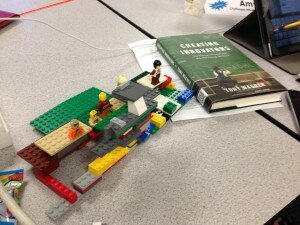Creative Learning by Design

Coming up with ways to help teachers to “think outside the box” can be challenging, especially in this time of teacher evaluations tied to standardized test scores, implementation of common core standards, and new standards-based report cards. Where, oh where, does creativity and innovation fit in our standards-based system? But just as designing learning for students that allows room for them to practice creativity in a safe environment requires a creative approach, professional developers need to do the same in designing learning for teachers, especially when the overarching goal is for teachers to “create innovators.”
In my backwards-designed professional development workshop, one of my goals for teachers was to be able to imagine what a creative learning environment might look like – what elements were required for their students to be able to develop the traits of an innovator. I turned to a strategy I learned about a few years ago through the Model Schools Conference, put on by the International Center for Leadership in Education. This strategy is LEGO® SERIOUS PLAY® – one that two of our schools have implemented very successfully with students, with many boxes of Lego blocks!
 The idea is simple. Use the Lego blocks to build a model, and then explain what you put in the model and why. This is adaptable to any content area or learning topic. I have seen first graders build models of family traditions, using iPads to record each others’ narratives, and 3rd graders build models of time machines from a story they read, then practice oral presentation skills sharing their models with the class. Other ideas: Students could build models of the scientific process “in action” or history students might build a model showing the effects of the Cold War. There is a great deal of both creativity and critical thinking that goes into this task, and it is amazing what those colorful little Lego blocks can do to inspire that creativity, while helping students reach deeper insights. This activity can work with learners of all ages.
The idea is simple. Use the Lego blocks to build a model, and then explain what you put in the model and why. This is adaptable to any content area or learning topic. I have seen first graders build models of family traditions, using iPads to record each others’ narratives, and 3rd graders build models of time machines from a story they read, then practice oral presentation skills sharing their models with the class. Other ideas: Students could build models of the scientific process “in action” or history students might build a model showing the effects of the Cold War. There is a great deal of both creativity and critical thinking that goes into this task, and it is amazing what those colorful little Lego blocks can do to inspire that creativity, while helping students reach deeper insights. This activity can work with learners of all ages.
So, I gave my teachers the task of building a model of the ideal learning environment where creativity and innovation can flourish. They had fun, imagined, and thought deep outside the box about these things. They played, they tapped into their passion for learning, and they are now clearly focused on the task at hand – their purpose in this grant project – to really build these environments for their students,
Here is one example – enjoy!


